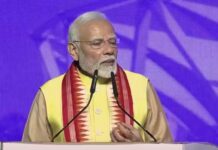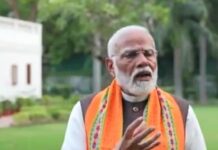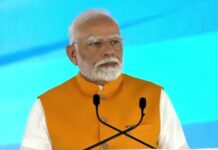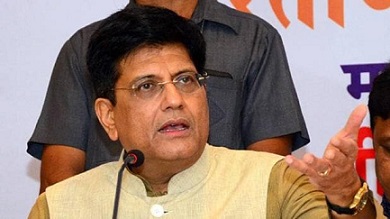By Our Correspondent
NEW DELHI: Union Minister of Commerce, Industry and Railways, Piyush Goyal, in a written reply in the LokSabha said promotion of industries is a continuous and ongoing effort of the Government. Government has taken a number of steps, in addition to the ongoing schemes, to boost the growth of industries.
He said that Aatmanirbhar Package to boost Industrial growth has been announced by the Government for Rs. 20.97 lakh crore with bold reforms in a number of sectors. The Emergency Credit Line Guarantee Scheme (ECLGS), having provision of Rs 3 lakh crores, is 100% credit guarantee and Collateral Free Automatic Loans for MSMEs. Financial support has been given to the stressed MSMEs with infusion of Rs.20,000 crore equity support through Subordinate Debt. Fund of Funds created to infuse equity worth Rs.50,000 crore in the MSME Sector by setting up Rs.10,000 crore Corpus Fund. Also, Government is ensuring timely payment to the MSMEs by instructing all Government of India and CPSEs to clear all receivables of MSMEs within 45 days. Procurement from domestic companies is being encouraged by disallowing global tender in government procurement tenders upto Rs 200 crores.
Higher FDI cap has been allowed through automatic route in a number of sectors by streamlining and liberalising several sectors.Empowered Group of Secretaries (EGoS) & Project Development Cells (PDCs) have been set up in order to provide support and facilitation to investors for investing in India and to boost growth in key sectors of the economy.A centralized Investment Clearance Cell is being created, which would provide end-to-end facilitation support, including pre-investment advisory, information related to land banks and facilitating clearances at Central and State level.
In order to realize the economies of scale, incentives are extended to units as per annual increases in their production/sale under Production Linked Incentive (PLI) scheme. PLI scheme has been announced for large scale electronics manufacturing (Rs.40,955 crore), medical devices (Rs.3,420 crore) and KSMs/ Drug Intermediates and APIs (Rs. 6,940 crore).In order to promote domestic manufacturing of sectors facing high imports or cheaper imports, incentives are provided through rationalization of Basic Customs Duty on identified products underPhased Manufacturing Programme (PMP). Presently, PMP is in operation for Cellular Mobile Handsets and e-vehicles, Goyal said.
The Government has launched the National Infrastructure Pipeline (NIP) in December, 2019 to provide world-class infrastructure across the country and improve the quality of life for all citizens. As per Final Report submitted by the NIP Task Force, the projected total expenditure on infrastructure would be of Rs. 111 lakh crore during the period FY 2020-25.
As per the data available with the Directorate General of Commercial Intelligence and Statistics (DGCIS) exports in 2019-20 were $ 313.36bn as compared to $330.08bn in 2018-19.
Several measures have been taken recently to boost export credit, which include the following:On 01-04-2020, RBI extended the time period for realization and repatriation of export proceeds for exports made up to or on 31-07-2020 from 9 months to 15 months. On 22-05-2020, RBI extended the time period for completion of remittances against normal imports into India (except in cases where amounts are withheld towards guarantee of performance) from 6 months to 12 months from the date of shipment for imports made on or before 31-07-2020. On 23-05-2020, RBI increased the maximum permissible period of pre-shipment and post-shipment export credit sanctioned by banks from the existing one year to 15 months, for disbursements made up to 31-07-2020. RBI vide its circular dated 20-09-2019, has enhanced the sanctioned limit for classification of export credit under PSL from Rs.25 crore to Rs.40 crore per borrower.
Directorate General of Foreign Trade is implementing various schemes for promotion of exports, which include schemes related to export incentives, access to duty free inputs for exporters, refund of duties and taxes, and transport and marketing support. A State Export Promotion Committee (SEPC) for Tamil Nadu has been constituted under the Chairpersonship of the Chief Secretary of Tamil Nadu. District Export Promotion Committees (DEPCs) have been set up in 37 districts in Tamil Nadu. Potential products for exports have been identified and notified for 37 districts in the State, including Karur District.
Government has put in place a liberal and transparent policy for Foreign Direct Investment (FDI), wherein most of the sectors are open to FDI under the automatic route. The Government reviews the FDI policy on an ongoing basis and makes changes from time to time, to ensure that India remains an attractive & investor friendly destination. It has been the endeavor and intent of the Government to put in place an enabling and investor friendly FDI Policy.
FDI policy is an enabling policy which is uniformly applicable in the country across all scales of industries including small and medium enterprises.Details of Foreign Direct Investment is maintained remittance-wise. The Foreign Direct Investment Equity Inflow data inter-alia includes the name of the Foreign company, Indian company including MSMEs, country, sector activity, amount and type of investment, etc. This data is very voluminous and available on the departmental website (www.dipp.nic.in).
India has one of the most liberalized FDI policy worldwide, wherein 100% FDI under automatic route is permitted in many sectors/ activities. There are only a few sectors/ activities where FDI is regulated i.e. subjected to government approval, with a cap or having other conditionality requirements. The FDI policy equally applies to the MSME sector. Further, the Government reviews the FDI policy on an ongoing basis and significant changes are made in the FDI policy regime, from time to time, to ensure that India remains increasingly attractive and is viewed as an investor-friendly investment destination. A liberalised FDI Policy is being pursued to ensure that along with attracting investment, modern and cutting edge technology is brought in the country to improve overall productivity and competitiveness.
Further, the extant FDI Policy on Single Brand Product retail trading contributes significantly to the development of MSME sector thereby encouraging increased sourcing of goods from India, thereby enhancing competitiveness of Indian MSMEs, providing access to global designs, technologies and management practices.
FDI Policy on Single Brand Product retail trading, in case of proposals involving foreign investment beyond 51%, mandates sourcing of 30% of the value of goods procured, to be done from India, preferably from MSMEs, village and cottage industries, artisans and craftsmen, in all sectors.Further, the FDI Policy on Multi Brand Retail Trading provides that, at least 30% of the value of procurement of manufactured/processed products purchased shall be sourced from Indian micro, small and medium industries, which have a total investment in plant & machinery not exceeding US $ 2.00 million.






















